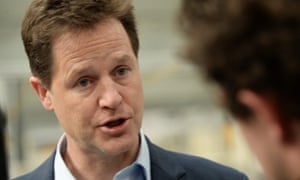A good move for our profession in the UK?
Press freedom
Lib Dems to propose law protecting journalism from state interference
Party will promise charter on press freedom and will vow to end government involvement in appointing heads of broadcasting regulators
Guardian Political editor
Tuesday 31 March 201520.03 BST
http://www.theguardian.com/media/2015/mar/31/lib-dems-to-propose-law-protecting-journalism-from-state-interference?CMP=share_btn_tw

A right to protect journalism from state interference and an end to ministers appointing the heads of broadcasting regulators are set to be proposed by the Liberal Democrats in a new “first amendment”-style charter on press freedom to be outlined in the party’s manifesto.
The Lib Dem policy document is expected to suggest there should be a new statutory recognition of journalism so that newspapers and other media are not required to rely solely on the freedom of expression rights as spelled out under article 10 of theEuropean convention on human rights.
It has been argued by some media organisations that article 10 does not hold the same weight as first amendment of the American constitution, which states that it is illegal for the US Congress to pass any law “abridging the freedom of speech or of the press”.
Article 10 of the ECHR guarantees the right “to hold opinions and to receive and impart information and ideas without interference by public authority and regardless of frontiers”. The wording, it is argued, reduces journalists’ right to resist those seeking injunctions to prevent publication.
The proposed package is also expected to include:
- An end to the right of ministers to appoint the chairs of Ofcom and the BBC’s internal regulator, the BBC Trust. Appointments would be made via an independent body such as the commissioner for public appointments, but would not preclude a politician being appointed.
- A requirement that any decisions on media takeovers are subject to parliamentary as opposed to ministerial oversight, in a bid to prevent a repetition of the circumstances surrounding News Corporation’s proposed takeover of BSkyB, which was going to be waved through by the then culture secretary, Jeremy Hunt, until the phone-hacking scandal erupted.
- An end to the ministerial veto that allows the attorney general to over turn decisions of the information tribunal – a veto power that was restricted by the supreme court in its landmark decision in March paving the way for the release of letters written by Prince Charles to ministers in 2004-05. The case took 10 years after the attorney general overruled the information commissioner, the official responsible for arbitrating on decisions concerning the Freedom of Information Act.
- A requirement for media regulator Ofcom to undertake periodic reviews of media plurality in the UK, independent of any specific takeover bid. Previously, the Lords communications select committee has called for a five-yearly review of the landscape of media plurality by Ofcom with limited powers for the watchdog to order the divestment of media interests, subject to the ultimate agreement of the culture secretary.
There would also be stronger defences for whistleblowers sending information to MPs and doctors.
The package is also expected to include a statutory public interest defence so that police officers cannot access a journalist’s phone records to discover the identity of a source without judicial oversight, after it emerged that the phone records of Sun journalist Tom Newton Dunn had been obtained without his consent by police investigating the Plebgate saga.
The proposed Liberal Democrat protections go further than those proposed by Tories in February since there would be a requirement for a journalist to be notified that the police were seeking a court application to look at their phone records.
In the conclusion of his inquiry into press standards in 2012, Sir Brian Leveson proposed that it would only be lawful to interfere with the media “insofar as it is for a legitimate purpose and is necessary in a democratic society”. But his idea was rejected by rightwing newspaper groups opposed to what they argued was statutory regulation of the press.
Lib Dem sources suggested that introducing a broader fundamental right to protection for journalism might, for instance, make it more difficult for members of the security services to be able to require newspapers to smash up computers containing classified information leaked by whistleblowers such as Edward Snowden, the former NSA contractor – as happened to the Guardian.
At the weekend Clegg presaged some of the proposals in the Liberal Democrat package saying he wanted reform of the laws on public interest defence.
Clegg said the current laws “are just far too opaque, in too many of our laws, exactly what is the strength and nature of a public interest defence.
“I would like to see that clarified in law, my party has always advocated that. The fact that prosecutors are relying on 13th-century laws, that we don’t have an up-to-date definition of what a public interest defence is, shows the need for a proper review and a proper reform of the law in this area.”
Clegg played a critical role in the compromise forged on Leveson’s proposals in 2013 including a press regulator set up under the auspices of a recognition body established by royal charter. The manifesto states it will revisit Leveson’s proposals in autumn 2016, after the new press regulator’s recognition panel has been in position for a year, to assess whether the regulatory system proposed by Leveson is functioning.
At present newspapers have set up their own independent regulator independent of the recognition panel, Ipso, set up by royal charter. Its effectiveness is a matter of dispute, and is not supported by every national newspaper.
No comments:
Post a Comment